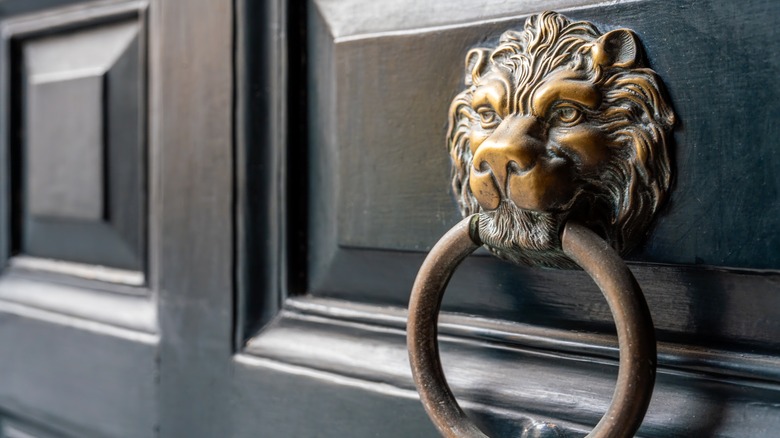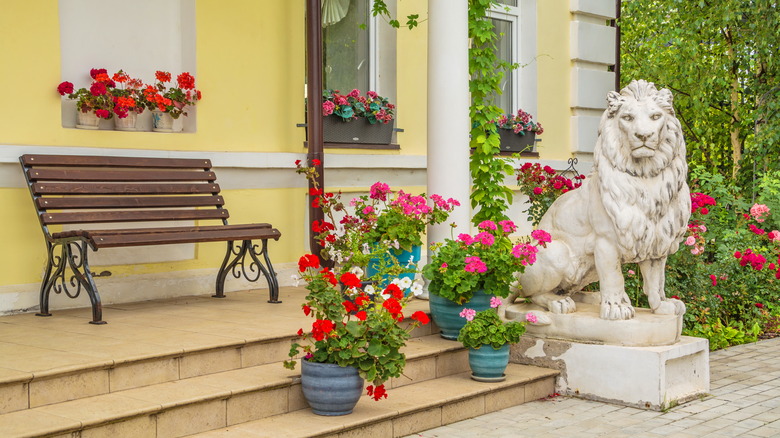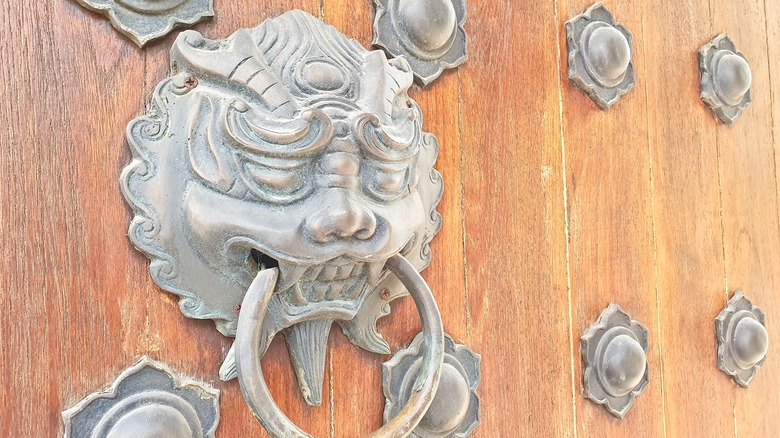What An Outdoor Lion Statue (Or Door Knocker) Really Means
Deemed the kings of the jungle, lions are known for being prime predators in the animal kingdom. The large cats are master hunters, able to prowl around the desert and jungle stealthily to sneak up on prey while also possessing the strength to take them down. Physically, lions are strong, cunning, and fearsome creatures, so it makes sense that symbolically, they represent traits that are as mighty as their roars. Lions often represent courage, strength, bravery, and protection. Since male lions have crown-like manes, the felines are also commonly linked to royalty or high positions of power.
If you spot one of these jungle cats lurking on the porches and yards of your neighbors, or keeping a vigilant eye from their doors, consider why a lion was selected as their animal choice. Like other outdoor decorations that hold secret meanings, lion statues or door knockers can potentially reflect qualities and values that a homeowner might want to bestow upon guests or emulate throughout their home. Whether it's a cultural or symbolic significance, spotting or adding these great cats to a home can add a feeling of regality and power, ward off evil energy and spirits, and invite good energy to someone's dwelling.
Lions as signs of power, protection, and wealth
Many cultures have used lions to represent power, protection, and wealth. Deities and kings were often depicted with varying parts of lions to represent power and regality — fitting qualities for rulers and gods. Sekhmet, the Egyptian goddess of war, has a lioness' head and a human body. Likewise, a popular landmark, the Great Sphinx, sports a human head and a lion body, and was built in homage to an Egyptian pharaoh. Egyptian tombs and burial grounds often had lion statues positioned at their entrances and exits to protect the dead.
In a similar vein, being greeted by lion statues at the entrance of a home or garden can invoke a sense of safety, reassurance, and protection. The apex predators, often set in pairs, standing guard outside of a home indicate the homeowner's desire to protect its inhabitants. Their intimidating presence reminds visitors that they are under watchful eyes and protection from the moment they enter and the moment they exit.
Homeowners may also incorporate the powerful felines into their outdoor decor to indicate wealth and prestige. As lions are often associated with royalty, statues of their likeness may be added to a porch or garden to add a majestic and regal touch to an outdoor area. In some countries, the addition of a lion statue to their exterior decor indicates that a home is fully paid off and completely owned by the homeowners.
Lions as spiritual guardians and bearers of good fortune
In the eastern parts of the world, lions not only symbolize power, protection, and strength, they are also seen as symbols of guardianship, luck, and fortune. The large cats are considered as guardians, specifically in China, where stone statues of lion-like creatures known as shi or foo dogs are placed in the front of homes and buildings to ward off evil spirits. In Chinese culture, to properly invoke feng shui and reap the benefits of guardian lions, the statues should be placed in the front of homes facing outward. There also must be two lion statues, one representing males, the other representing females.
In addition to being a stylish upgrade for doors, a lion spotted on a door knocker of a home can share the same purpose as Chinese foo dogs. They are seen as the guardian of the property, warding off negative energy and evil spirits before they can cross the threshold. While warding off bad energy, these lions also simultaneously invite positivity, luck, and fortune into a home.


